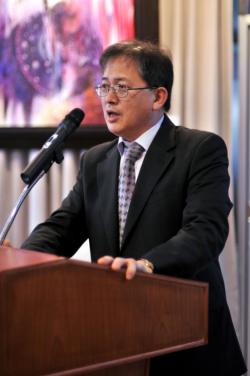
Some believe education comes with an end date: a child enters into formal schooling, stays for the mandated number of years and then moves on to either higher education or out into the working world -- mission completed, all necessary lessons learned.
Of course, we need only look to the challenges of today's complex world -- climate change, rampant urbanisation and rising inequalities -- to realise that the necessity of learning does not magically dissipate once formal schooling ends.
These modern challenges call for a new conception of education, one that is not constrained by a set time period or within the walls of formal institutions, but rather embraces learning as a lifelong pursuit and education as a central driver of peaceful, sustainable development. The late King Bhumibol Adulyadej set a tremendous example in this regard, noting that "learning is a never-ending process. Those who wish to advance in their work must constantly seek more knowledge."
It's a viewpoint that is reflected throughout the latest Global Education Monitoring (GEM) Report, "Education for People and Planet: Creating Sustainable Futures for All". Fittingly, Thailand's Friday launch of the publication spotlighted the late king's efforts in education and development.
The report takes a comprehensive and holistic view of education, looking not only at what is happening in classrooms and ministries around the world but also at the potential of this sector to play a central role in achieving all of the 17 goals of the 2030 Agenda for Sustainable Development.
The report highlights, for example, how education can inspire young people to pursue solutions to environmental problems, an issue that is particularly pertinent in Thailand, which is identified in the report as one of the 10 countries most affected by climate-related events between 1995 and 2014.
Engagement in out-of-school environmental activities strengthens in-class performance. The report notes Thailand's successes in this area, with more than 50% of Thai pupils participating in out-of-school activities involving environmental organisations, and 70% of Thai teachers saying they have participated in environment-related awareness-raising campaigns and activities, a significantly higher percentage than the global average. Globally, only a third of curricula frameworks around the world have a single reference to climate change and environmental responsibility, while more than half of the key terms pertaining to this area are found within Thailand's curricula framework.
These suggest a trend in Thai education worth applauding; however, as the economist Jeffrey Sachs writes in his foreword to the GEM report, some of its findings should "set off alarm bells around the world", and Thailand is no exception in this regard.

powerful case: Gwang-Jo Kim says disparities must be addressed.
Thailand, for example, is projected to achieve universal lower secondary education by 2055 and universal secondary education by 2085. And while these are in line with global projections of 2059 and 2084, they are still far beyond the 2030 deadline set out in Sustainable Development Goal 4 on Education.
The report also delves into the issues that continue to throw up barriers to equitable and inclusive education for all in Thailand. Gender equality issues are under-represented in Thai curriculum, according to the report, and less than 10% of people in leadership positions in Thai legislative bodies are women, while 63% of the country's illiterate adults are female and 30% of children aged 13-15 in Thailand experience school-related gender-based violence.
Meanwhile, the poorest young people aged 20-24 in Thailand have eight years of schooling, on average, compared to 14 years among the richest, while disparities are rife in urban settings, with 42% of the poorest people in urban areas completing lower secondary school compared to 93% of the richest. Education's reach has expanded greatly in Thailand; however, 380,000 primary school-age children in Thailand remain out of school.
Unesco is committed to working with its member states to find solutions to these challenges. Thailand's Education Ministry has made promoting lifelong learning and vocational education a priority, and the country's Office of Non-formal and Informal Education is active in these areas. More than 2.3 million people were enrolled in adult and continuing education programmes in Thailand in 2012, according to the Education Ministry.
We were likewise proud to join the Asean Secretariat in supporting the efforts of Thailand's Education Ministry to push for the ratification of the Asean Declaration on Strengthening Education for Out-of-School Children last year.
The report also raises concerns about how well young Thais are prepared for the world of work. Just 17% of adults in Thailand have attained tertiary education and only 8% of young people aged 15-24 are enrolled in technical and vocational education and training (TVET). Only 13% of people in Thailand had more than just a basic understanding of computers as tools compared to 85% in the Czech Republic, for instance. Our office works to strengthen TVET systems in Asia-Pacific by ensuring standardised qualifications.
The GEM report makes a powerful case to education planners on why a business-as-usual approach is no longer tenable. We must consider the ends our education systems are meant to achieve, expanding on initiatives that promote sustainability while also addressing disparities.
The report also underscores the fact that modern challenges cannot be addressed in isolation. Education's potential to positively influence values and behaviour to achieve these ends can and must be fully utilised -- for the benefit of people and the planet.
Gwang-Jo Kim is the director of Unesco Bangkok, the Asia-Pacific Regional Bureau for Education.